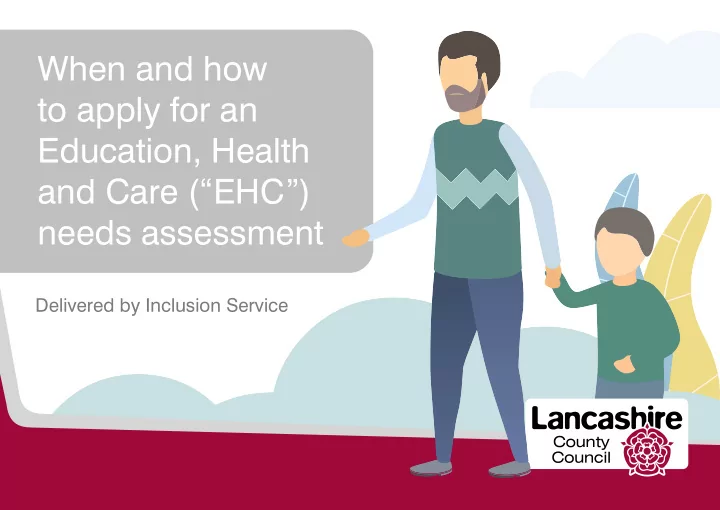

When and how to apply for an Education, Health and Care (“EHC”) needs assessment Delivered by Inclusion Service
Who is this training aimed at? • Practitioners in early years. • Practitioners in school settings.
What is Special Educational Needs? • A child or young person has SEN if they have a learning diffjculty or disability which calls for special educational provision to be made for him or her.
What is Special Educational Provision? “ Educational or training provision that is additional to or different from that made generally for other children or young people of the same age by mainstream schools, maintained nursery schools, mainstream post-16 institutions or by relevant early years providers. ” Code of Practice
Special Educational Needs (SEN) Support • SEN support should take the form of a four-part cycle: assess, plan, do and review. • Parents should be informed and their views listened to. • Be aware of other factors that can lead to learning diffjculties.
SEN Support Plans Childs Photograph Child/Young Person’s Forename: Surname Date of this plan: Year Group/Age Signature on behalf of school/college/setting: My review date: Plan number
Involving parents and pupils in planning and reviewing progress • The Code of Practice states that ‘schools must provide an annual report for parents on their child’s progress.’ • Schools should take to parents regularly to set clear outcomes and review progress towards them.
Involving parents and pupils in planning and reviewing progress • Teaching staff may need support to manage these conversations. • Include the views of pupils in these discussions.
Setting Targets • Link to personal aspirations. • Involve the child or young person and parents. • Ensure targets are SMART. • Match provision to targets.
When to review • This depends on the situation and the level of intervention the CYP is receiving. • Review regularly. • Formally review at least every half term. • Involve CYP and parents.
Funding for SEN Support “ All mainstream schools are provided with resources to support those with additional needs, including pupils with SEN and disabilities ”
EHC Needs Assessment • An Education, Health and Care (“EHC”) needs assessment is an assessment of a child or young person’s education, health and care needs. • A request can be submitted any time by a the young person or parent/carer or educational setting, or other professional e.g. paediatrician
Information required for application for EHC Needs Assessment • Evidence of the child or young person’s academic attainment (or developmental milestones in younger children) and rate of progress; • Information about the nature, extent and context of the child or young person’s SEN; • Evidence of the action already taken by the school or other setting;
Information required for application for EHC Needs Assessment • Evidence that where progress has been made, it has only been as the result of much additional intervention and support over and above that which is usually provided; • Evidence of the child or young person’s physical, emotional and social development and health needs, drawing on relevant evidence from clinicians and other health professionals and what has been done to meet these by other agencies.
Making the request COMMUNICATION SELF-HELP AND COGNITION AND AND INDEPENDENCE LEARNING INTERACTION SOCIAL, SENSORY AND/OR EMOTIONAL AND PHYSICAL NEEDS MENTAL HEALTH DIFFICULTIES
Cognition and Learning • Support for learning diffjculties may be required when children and young people learn at a slower pace than their peers, even with appropriate differentiation.
Communication and Interaction • Communication and interaction is an area of need that focuses on Speech, Language and Communication Needs (SLCN), and, Autism Spectrum Disorder (ASD).
Social, Emotional and Mental Health Needs (SEMH) • Children and young people may experience a wide range of social and emotional diffjculties which manifest themselves in many ways. • Other children and young people may have disorders such as attention defjcit disorder, attention defjcit hyperactive disorder or attachment disorder.
Sensory and/or Physical Needs • Sensory and/or physical needs is an area that encompasses: Hearing Impairment (HI) Vision Impairment (VI) Multi-sensory Impairment (MSI) Physical Disability (PD)
Outcome of EHC Needs Assessment • SEN Support Plan • EHCP
What is an Education Health Care Plan? • An Education, Health and Care plan is a legal document which describes a child or young person’s special educational needs, the support they need, and the outcomes they would like to achieve in their education, health and social care, and also prepare them for adulthood. • An EHC plan can result in additional support and funding for a child or young person with special educational needs.
What is an Education Health Care Plan? • EHC plan should be issued when the local authority considers the special educational needs of the child cannot be reasonably provided by a mainstream early years provider, school and/or post 16 institution.
Submit request for EHC needs LA decides to conduct EHC needs assessment assessment Yes No LA notifjes parent/young person of decision within 6 weeks of LA notifjes parent/young person submitting. of decision and right to appeal within 6 weeks of submitting. LA gathers information for Statutory Assessment – the assessment may solve the problem – EHC plan might not be needed Yes No LA decides if EHC plan is needed Draft Plan and LA notifjes parent/young consultation with setting person of decision and and parent Final Plan issued right to appeal within 14 CO-PRODUCTION within 20 weeks of weeks of submitting. MEETING submitting
Lancashire Local Offer www.lancashire.gov.uk/SEND
References SEND Code of Practice: 0 to 25 years www.gov.uk/government/publications/send-code-of- practice-0-to-25 SEND 0 – 25: A booklet for parents, carers and professionals by Stockton-on-Tees Borough Council Education, Health and Care plans: examples of good practice by Council for disabled children
Recommend
More recommend